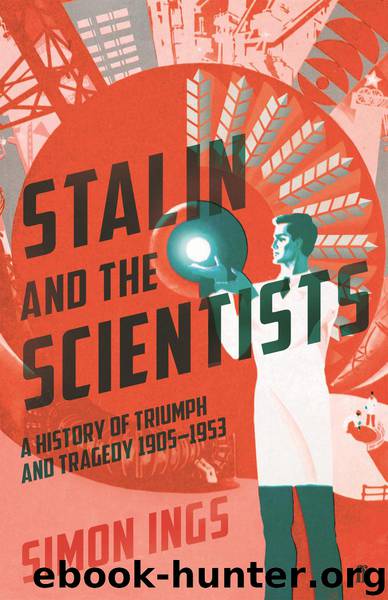Stalin and the Scientists by Simon Ings

Author:Simon Ings [Simon Ings]
Language: eng
Format: epub
ISBN: 9780571290093
Publisher: Faber & Faber
Published: 2016-08-14T04:00:00+00:00
Also on the delegation was Ernst Kolman, whom the Politburo had charged with supervising and reporting on the political behaviour of two suspect members of the delegation: Boris Hessen; and the leader of the party, Nikolai Ivanovich Bukharin.
Of the two, Bukharin was by far the more important, and the one in the more serious trouble. Lenin himself had dubbed him the Party’s ‘leading theoretician’. But the dead leader’s support now marked Bukharin out as a possible opponent of Stalin. Making his position even more delicate, Bukharin had once been a pupil of Alexander Bogdanov.
Bukharin did not necessarily oppose Stalin’s efforts to make science over in the service of the state – to make all science into applied science, to be applied moreover in the service of the Party. Explaining the Soviet scientific revolution in London, he described how ‘the rupture between intellectual and physical labour’ was being eliminated and scientific research was rising to a new level of efficiency. (His prime example was plant breeding.)20
But there were crucial and growing differences between Bukharin and Stalin. Stalin’s ‘Great Break’ roused nothing but contempt in Bukharin. ‘Ignorant nonsense’, he called it: one of several remarks that, by December 1930, had got him expelled from the Politburo.
Bukharin’s opening speech was enthusiastic, politically on-point and, for the international audience gathered in London, quite uncontroversial. The days of ‘scholastic monasteries, the laboratories of alchemists and the quiet offices of individual university scholars’ were gone, he announced. Science now had to be organised along the lines of big industry. Few ambitious scientists of that time would have disagreed with him, regardless of their politics.
The contribution of the other ‘suspect’ delegate, Boris Hessen, was of quite a different order. Written with an eye to saving his career (and possibly his neck), and delivered in the presence of Ernst Kolman, a man he knew was spying on him, Hessen’s paper, ‘The Socio-Economic Roots of Newton’s Principia’, ought to have been a piece of utter humbug. It turned out, however, to be the most influential paper presented at the conference. In Britain it brought together under a common purpose an entire generation of left-leaning scientific celebrities, from John Haldane to John Bernal. Internationally, it inspired an approach to the history of science which still holds sway today.
Hessen used Newton’s work as an example of how good, valuable, proven science is at the same time a product of its time and class. Hessen demonstrated that Newton’s accomplishments in physics were both astonishing glimpses into the nature of reality and historically determined documents, full of philosophical and religious conclusions which Newton could not help but draw from the economic order around him.
Hessen’s paper contained a double message. As far as the audience in London was concerned, Hessen had expressed all that was valuable and timely and commonsensical about Marx’s views on science. Science was not the product of great minds somehow isolated, priestlike, from the world and its practical demands. It was a cultural practice: it was what people did. For
Download
This site does not store any files on its server. We only index and link to content provided by other sites. Please contact the content providers to delete copyright contents if any and email us, we'll remove relevant links or contents immediately.
Enlightenment Now: The Case for Reason, Science, Humanism, and Progress by Steven Pinker(7303)
A Journey Through Charms and Defence Against the Dark Arts (Harry Potter: A Journey Through…) by Pottermore Publishing(4796)
The Immortal Life of Henrietta Lacks by Rebecca Skloot(4571)
A Journey Through Divination and Astronomy by Publishing Pottermore(4375)
Elon Musk by Ashlee Vance(4118)
Origin Story: A Big History of Everything by David Christian(3679)
COSMOS by Carl Sagan(3617)
Alchemy and Alchemists by C. J. S. Thompson(3509)
Bad Pharma by Ben Goldacre(3419)
Enlightenment Now by Steven Pinker(3363)
Shadow of Night by Deborah Harkness(3352)
Inferior by Angela Saini(3310)
A Mind For Numbers: How to Excel at Math and Science (Even If You Flunked Algebra) by Barbara Oakley(3293)
Origin Story by David Christian(3191)
The Code Book by Simon Singh(3172)
Signature in the Cell: DNA and the Evidence for Intelligent Design by Stephen C. Meyer(3123)
The Elements by Theodore Gray(3050)
A Brief History of Time by Stephen Hawking(3017)
A Journey Through Potions and Herbology (A Journey Through…) by Pottermore Publishing(2843)
